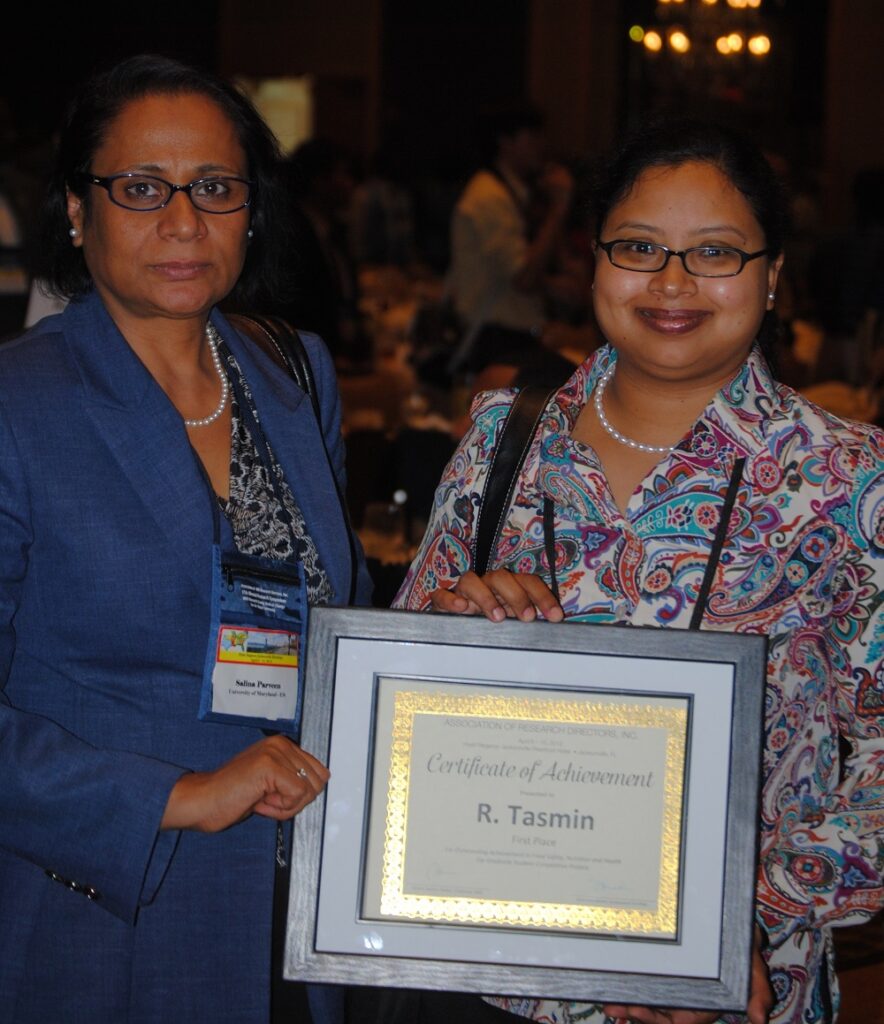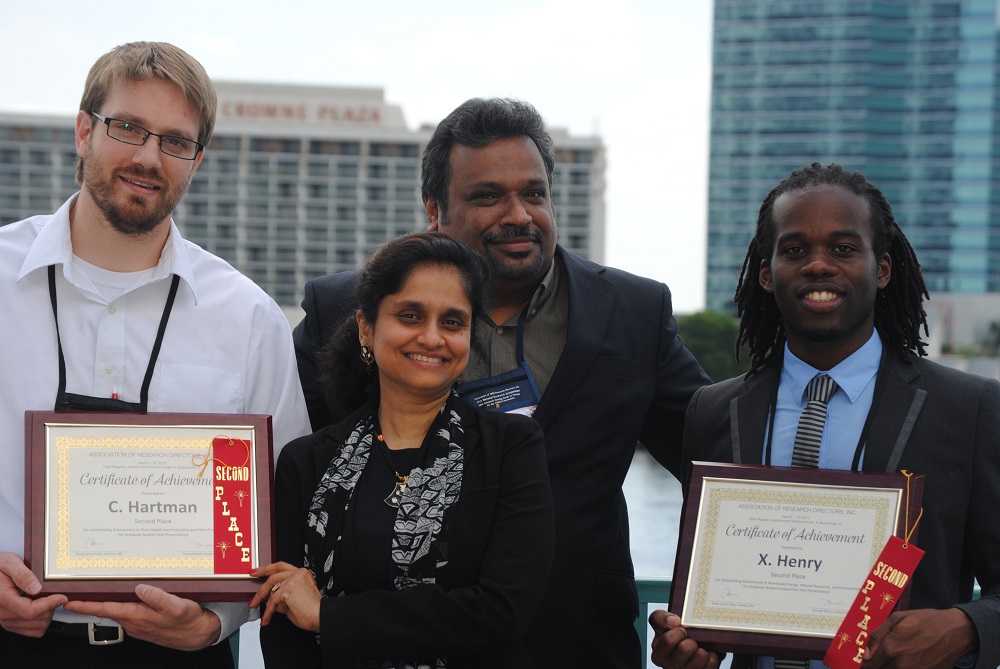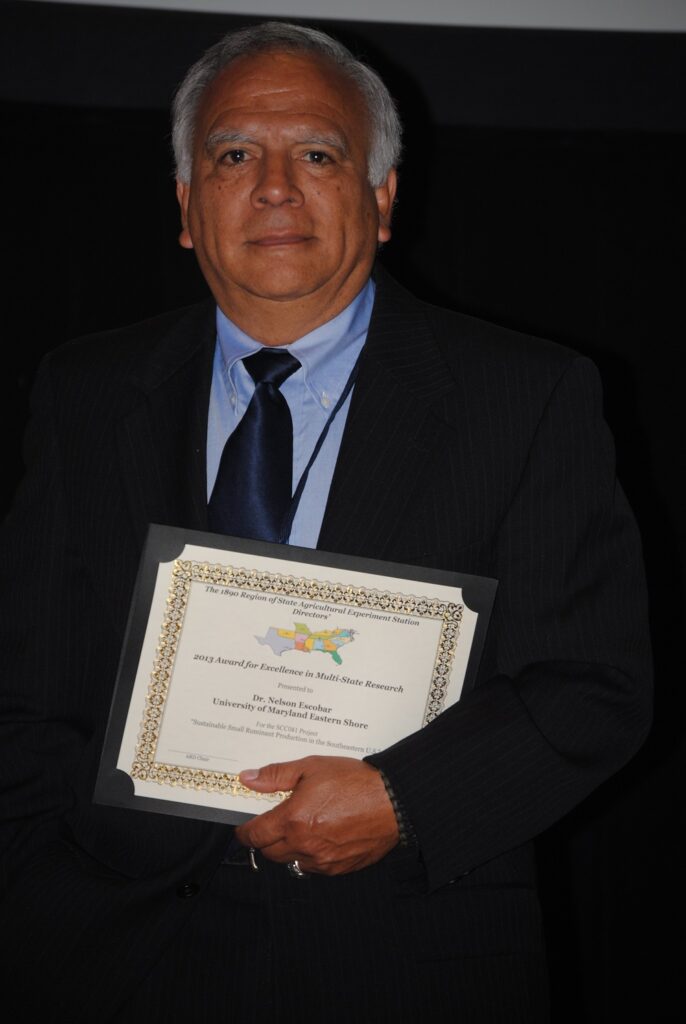PRINCESS ANNE, MD – April 17, 2013 – UMES brings home six wins and one faculty award from the 17th Biennial Research Symposium of the Association of Research Directors (ARD) held in Jacksonville, Florida. Overall, with one first place win, four second place wins and one third place win, the university won more research presentation awards than any of the other 17 participating universities.
“I congratulate all students, faculty and staff for these excellent results,” said Dr. Moses Kairo, dean of the School of Agricultural and Natural Sciences and director of the UMES Agricultural Experiment Station. “This is a clear testament of the high quality of research, training and mentorship at UMES. We must continue to strive harder to provide high quality education and to produce research solutions to address the challenges facing Maryland and the nation.”

Rizwana Tasmin secured the university’s only first place win for her poster presentation titled “Chlorine Inactivation of Non-Resistant and Antibiotic Resistant Strains of Salmonella Typhimurium Isolated from Pre-Chill and Post-Chill Poultry Carcasses.” Tasmin is a graduate student studying food science and technology. Her research is conducted under the leadership of senior researchers Salina Parveen, Ph.D., associate professor in the Department of Agriculture, Food and Resource Sciences and Tom Oscar, Ph.D., of the USDA/ARS Residue Chemistry and Predictive Microbiology Research Unit at UMES.

Graduate student Nadine Burton won second place for her poster presentation titled “Sumbiotic Performance of Genetically Diverse Cowpea Genotypes on the Delmarva Peninsula.” Burton is studying food and agriculture sciences and conducts her research under senior researchers Robert Dadson, Ph.D., interim chair, Fawzy Hashem, Ph.D., research associate professor, and Corrie Cotton, research assistant professor, all in the Department of Agriculture, Food and Resource Sciences.

For the oral presentation of his research, “Nitrogen Use Efficiency (NUE) Through Sensor-based Algorithms and On-the-go Application, Christopher Hartman won second place. Hartman is a graduate student who serves as a lecturer in the Department of Engineering and Aviation Science. He works in conjunction with senior researchers Abhijit Nagchaudhuri, Ph.D., professor of engineering in the Department of Engineering and Aviation Sciences and Madhumi Mitra, Ph.D., associate professor of biological and environmental sciences in the Department of Natural Sciences.
Xavier Henry is a professional pilot via the UMES Aviation Sciences program and a graduate student specializing in food and agricultural sciences. He won second place for the oral presentation of his research that’s conducted under senior researchers Nagchaudhuri and Mitra. His research is titled “Design and Evaluation of a Spectrally Optimized Algal Photobioreactor for Carbon and Nitrogen Capture from Fossil Fuel Efflux.”

A graduate student studying food and agriculture sciences, Jorge Rodriguez won second place for his poster presentation depicting the “Effects of Feeding a Pelletized Diet Containing Pumpkin Seeds on Nematode Fecal Egg Counts (FEC) and Blood Hematocrit (PCV) in Lambs.” His poster is a component of a project on natural anthelmintics for sheep and goats. The project is sponsored by a grant from USDA/NIFA and the principal investigator is E. N. Escobar, Ph.D., an assistant professor of small ruminant production in the Department of Agriculture, Food and Resource Sciences.

A third-place win was awarded to Ian Bottone, who is an undergraduate student studying general agriculture and serving as a sustainable agriculture research intern. His research, “Determining Urea Persistence in a Coastal Plain Soil: An Incubation Study,” is being conducted under senior researcher Arthur Allen, Ph.D., associate professor in the Department of Agriculture, Food and Resource Sciences and associate research director.
Small Ruminant Production in the Southeastern U.S.” At UMES, he conducts small ruminant research pertaining to parasite control, synchronized breeding, and the use of sheep and goat to manage unwanted vegetation. His work complements the work of others within the 1890 consortium of small ruminant researchers. They meet annually to assure there is no duplication of efforts as they advance the body of knowledge related to small ruminants.

Dr. Enrique Nelson Escobar is one of the nine recipients who won “Excellence in Multistate Research Awards” during the conference. He was awarded for his participation in the SCC081 Project, “Sustainable
Some 900 faculty, staff, researchers and students attended the 17th Biennial Research Symposium, which brandished the theme 1890 Research: Sowing Seeds of Change for the Global Community. More than 300 undergraduate and graduate students competed for recognition in oral and poster competitions. Faculty presentations were non-competitive.
For more information about research in the School of Agricultural and Natural Sciences, visit www.umes.edu/SANS.
###
Suzanne Waters Street, agriculture communications specialist, School of Agricultural & Natural Sciences, 410-621-3850, sstreet@umes.edu.

